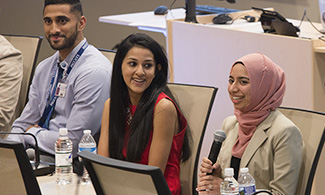Tuesday, May 16, 2017
Overcoming boundaries; LUCOM-SNMA panel tackles tough topics
Mon, 15 May 2017Asa Keimig | LUCOM Marketing
 The LUCOM-Student National Medical Association (SNMA) hosted a panel of student-doctors and physicians with varying ethnicities, cultures, and specialties on Tuesday, May 9, to discuss cultural barriers in medicine and the needs of underserved communities.
The LUCOM-Student National Medical Association (SNMA) hosted a panel of student-doctors and physicians with varying ethnicities, cultures, and specialties on Tuesday, May 9, to discuss cultural barriers in medicine and the needs of underserved communities.
SNMA student leadership had student-doctors submit questions, prior to the panel, after reading brief biographies on the panelists. The physicians on the panel were: Wilby Kurian, MD, Family Medicine; Oluwatoyosi Omojaro, MD, Pediatrics; and David J. McLario DO, FAAP, FACEP, Emergency Medicine/Pediatrics. Student-Doctors on the panel included: Vaneesha Patel, Class of 2019; Arthur Gross, Jr., Class of 2019; and Sarah Choudhry, Class of 2020.
Religion, gender, socioeconomic backgrounds, and ethnicity all play a large role in shaping the cultural perspective of each and every person. As future physicians, LUCOM student-doctors will inevitably encounter patients from varying walks of life and perspectives. The goal of the panel was to help eliminate any confusion on cultural barriers to better facilitate physician-patient interaction and quality care. “People have a perception of you based off what you look like or what you believe, but each person is different and you have to give them the chance to show you who they are,” said Gross. “One way to overcome the divide is to expose yourself to others that are different than you because the more exposed you become, the more comfortable you become.”
LUCOM-SNMA President Angela Tseng, Class of 2020, placed emphasis on the word “start” in her opening remarks by relaying that cultural competency cannot and will not be achieved in a single setting. “This is a lifelong process in the sense that no two people no matter how similar their ethnicity, religion, gender, and socioeconomic setting, experience the world the same way. As future physicians, learning how to cross cultures and understand the various barriers each culture endures will allow us further insight on how to communicate effectively with our patients, but most importantly build trust.”
Cultural barriers and the topics of racial inequality are often tension filled subjects though very important to discuss. “Culture shapes the lens in which each person experiences and views the world,” added Tseng. “As future DOs, we have been taught from our first day of school to take into account patients' mind, body, and spirit, and medicine is about the person and not their disease.”
Attendees submitted their questions anonymously through an online survey and were then given to the panelists several days before in order to create thoughtful, honest responses. Student-Doctors of both majority and minority cultures provided feedback stating that this was a great way for to ask and answer hard questions. “Culture is heavily integrated into every facet of this holistic approach, thereby it is vital that we as student-doctors learn and grow to be more culturally aware and sensitive now, that way, we are able to be clinically excellent and culturally competent physicians later, but also better colleagues and friends” said Tseng.
One of Tseng’s goals after the panel event ended was for attendees to continue asking questions of other cultures, to never stop learning about other cultures. “I believe that we can model Jesus' actions, and through the power of The Holy Spirit, facilitate cultural and racial healing by taking actions to be intentionally thoughtful with our words, expose ourselves to relationships of cultures differing to our own, and advocating for culturally and racially marginalized people groups.”